Politicians dodging questions? An equivocative analysis of British MPs ‘Ask Me Anything’ sessions on Reddit
This blogpost is the second in a two-part series which outlines the result of my dissertation on MP’s online Q&As sessions on social media. The first detailed the types of questions asked , and this second one covers MP’s answers. The dissertation received a Distinction from the University of Birmingham, 2019.
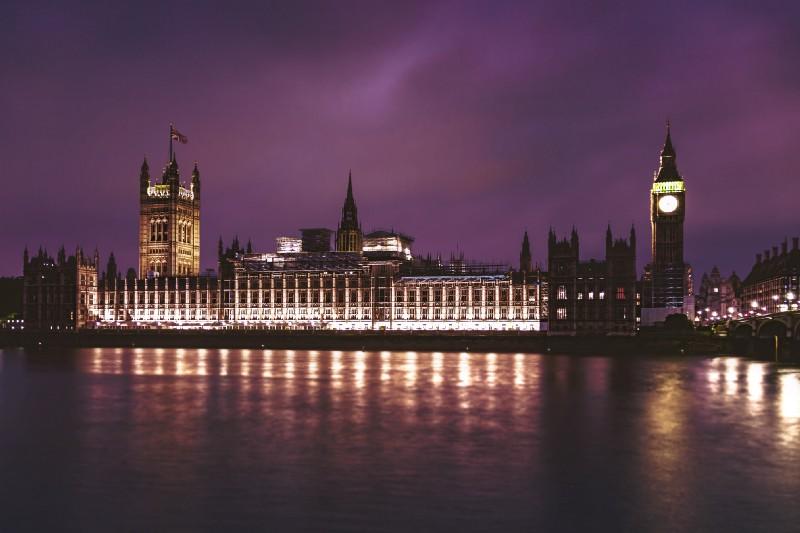
Introduction
The current British political climate can be described as bleak.
Views on our political system are at an all time low. Feelings of political pessimism, powerlessness and disengagement are growing. In this environment politicians are normally seen as out of touch liars who cannot give straight answers.
But how much do politicians evade or equivocate in their answers? Especially when asked by potential young voters?
To answer these questions I conducted a study that investigated the extent to which British MPs did or did not answer questions in online Q&A sessions on Reddit.
I did this by drawing on methods from political communication. Central to my analysis was the work of Dr Peter Bull of York University who has studied the political interviews and created schemes for identifying questions, replies and non-replies (Bull, 1994), and the ways in which politicians equivocate by evading giving answers (Bull and Strawson, 2019).
Research design, methods and methodology
For a fuller account please read my previous blog post.

A sample was identified which included 11 MP’s Ask Me Anything (AMA) sessions on Reddit. The sample was made up of 9 men and 3 women.
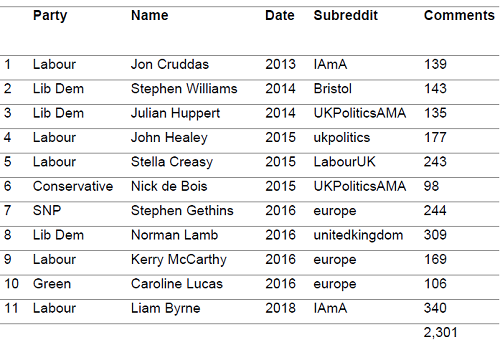
Comments were uploaded to Nvivo 12 for analysis.
Each AMA was first screened for instances where MPs had replied to comments which contained questions. Both questions and responses were then coded using Bull’s question, reply rate, and equivocation typologies.
Types of questions
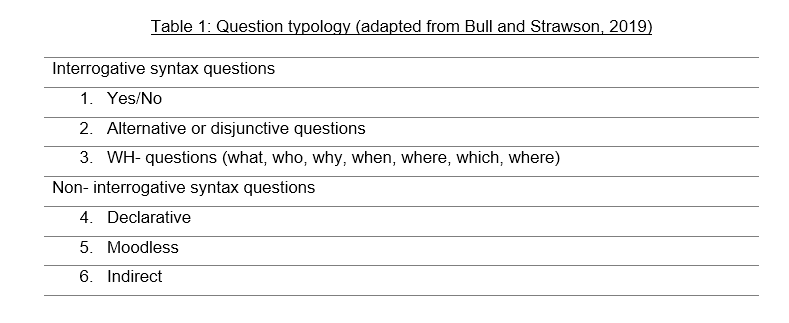
Questions can be defined as either having interrogative or non-interrogative syntax: sentences which distinctly ask a questions, and those what does not.
Interrogative questions are as follows:
- Yes- No questions expect affirmation or negation, e.g. ‘will you sign Early Day Motion 23?’
- Alternative or disjunctive questions expect a reply from two or more given options, e.g. ‘will you be supporting the Remain or Leave campaign?’
- WH-questions are those that typically ask for a missing variable to be given and responded. These are commonly what, who, why, when, where and which questions. E.g. ‘why did you want to become a politician?’ or ‘what do you think of Universal Credit?’
Non-interrogative type questions comprise of declarative, moodless and indirects.
- Declaratives are statements which have a rising intonation at the end, e.g. ‘You realise the negative impact of your policies are, right’
- Moodless are those without a finite verb. For example, if an MP had responded to a question citing a policy as excellent and a user responded ‘An excellent policy?’
- Indirect questions are a means of asking a question through reporting or quoting someone else
These types of questions might seem to represent a problem for categorising questions; but because most are put forward as statements for agreement or disagreement, so they can be treated as Yes-Nos, alternative or WH-questions in most circumstances.
Types of answers and reply rates
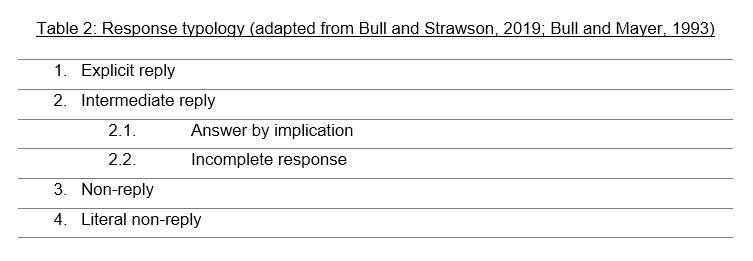
Once questions were categorised the response of the MP could then be analysed by comparing to the type of question asked.
Explicit replies where when MPs gave full answers to the question(s) asked. Intermediate replies were those which answered by implication and an incomplete response was to multibarrel question (i.e. only answers one of a three-part question). Non-reply was when there was a complete failure to answer the question in an MP’s response.
I added a fourth category called literal non-reply which accounted for questions which had not received a reply-comment by MPs at all. I chose to add this additional category because of Reddit’s environment which differed from traditional political interviews.
By comparing the number of explicit, intermediate, non-replies and literal non-replies I was able to find out how often individual MPs did and did not answer questions, and an overall statistic from the case study sample.
Types of equivocation
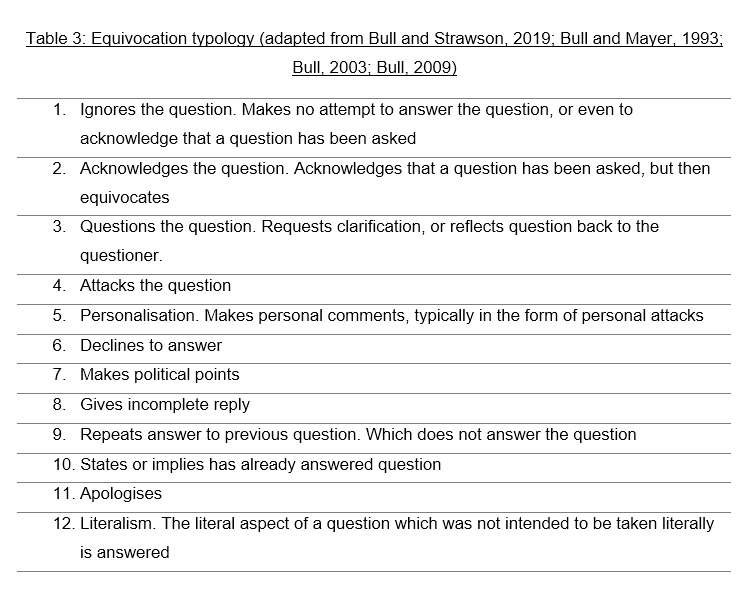
Non-replies and intermediate replies were then analysed using Bull’s equivocation typology. It should be noted that the above categories are not mutually exclusive. This means that an equivocative answers can be coded under multiple categories.
Limitations
A major limitation of this study is the lack of a second researcher to review codes and themes indepently (see: intercoder reliability).
However the use of a pre-existing scheme partly allays the above, since these typologies and methods have been used in several successful studies.
Results
The study analysed 11 MPs AMAs on Reddit between 2011 and 2018. Findings are presented both excluding and including literal non-replies. Since this helps shows levels of equivocation in the MP’s responses themselves and overall responses.
The key finds when only focusing on replies were:
- 57% answered the questions in full by giving explicit replies
- 24% gave partial answers through intermediate replies
- 20% did not answer the question through non-replies
When including literal non-replies this was:
- 34% answered questions in full
- 11% gave partial answers
- 14% gave non-replies in their direct replies
- 42% literal non-replies through not directly replying
Reply rates
Reply rates between individual MPs varied widely. Including and excluding literal non-replies also had an effect on overall rates. This is because some AMAs had higher volumes of comments than others and less comment replies by MPs compared to less popular ones. For example, Nick de Bois MP gave 90% explicit replies in his answers, but when including literal non-replies this dropped to 39%.
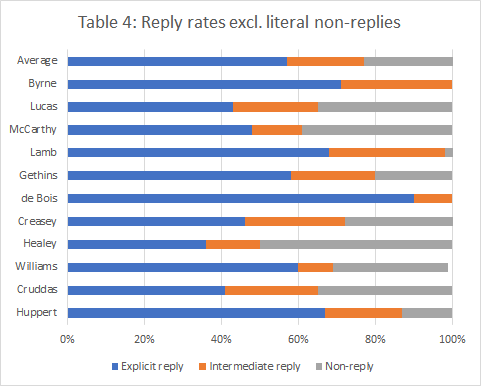
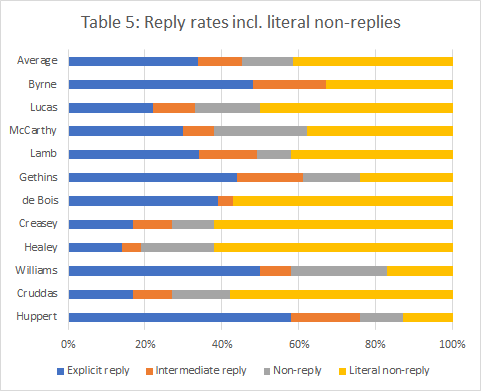
Equivocation rates
The ways MPs evades questions was measured using Bull’s equivocation typology. Individual results for MPs and an average are provided in Table 6 below.-
The majority of equivocation to questions involved non-replies (68%), followed by incomplete replies (19%), making political points (4%), acknowledging the question (3%), questioning the question (3%), and stating/implying they had already answered the question (1%).
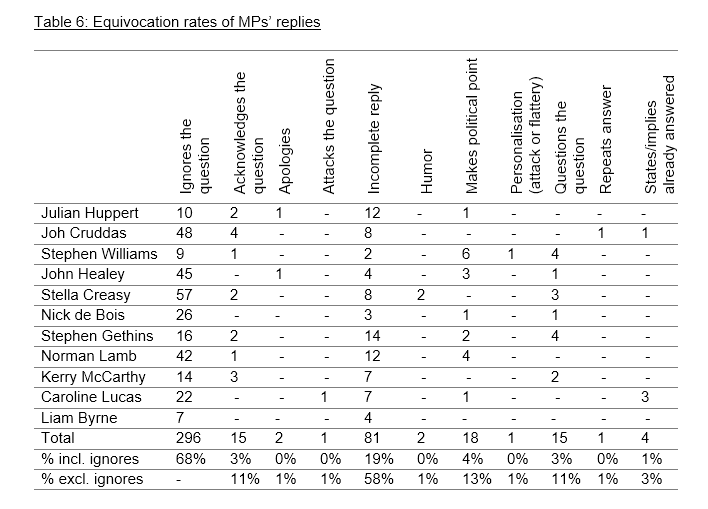
Discussion
The results of this study indicate that MPs did not usually evade, dodge or equivocate in their answers to questions asked by Reddit users. Overall reply rates were 77% when including explicit and intermediate replies. When literal non-replies were added the overall reply rate dropped to 45%.
When measuring for equivocation it was found that incomplete replies was the most popular type, followed by making political points, acknowledging the question, questioning the question, and stating or implying they had already answered the question.
Rates of personalisation (flattery or attack) were notably low, with only one instance. This lines up with Jackson and Lilleker’s (2011) finding of MPs using social media for impression management and self-promotion. It is also to be expected given the anonymous nature of Reddit and the promotional aspect of AMAs. This is in contrast to the hostile environment of political interviews and PMQs found in other studies (Bull and Strawson, 2019).
Note: This blogpost was originally posted on Medium in November 2019.




